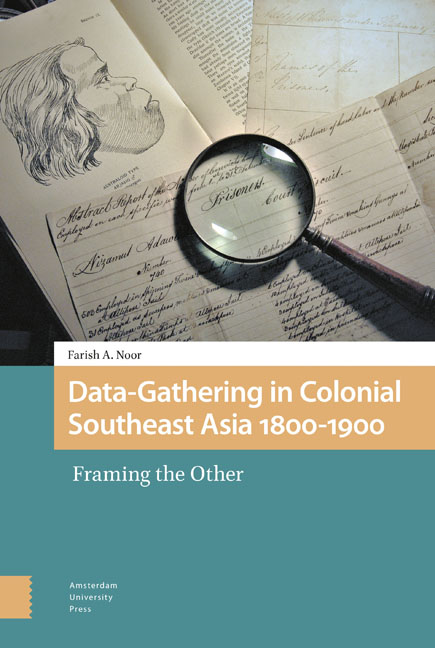Book contents
- Frontmatter
- Dedication
- Contents
- A Note on Spelling
- Introduction: The Panopticon in the Indies: Data-Gathering and the Power of Knowing
- 1 Caught in the Eye of Empire: Stamford Raffles’ 1814 Java Regulations
- 2 Deadly Testimonies: John Crawfurd’s Embassy to the Court of Ava and the Framing of the Burman
- 3 Fairy Tales and Nightmares: Identifying the ‘Good’ Asians and the ‘Bad’ Asians in the Writings of Low St. John
- 4 The Needle of Empire: The Mapping of the Malay in the works of Daly and Clifford
- 5 The Panopticon in the Indies: Data-collecting and the Building of the Colonial State in Southeast Asia
- Appendix A Proclamation of Lord Minto, Governor-General of British India, at Molenvliet, Java, 11 September 1811
- Appendix B Proclamation of Stamford Raffles, Lieutenant-General of Java, At Batavia, Java, 15 October 1813
- Appendix C The Treaty of Peace Concluded at Yandabo
- Appendix D The Treaty of Friendship and Commerce between Her Majesty and the Sultan of Borneo (Brunei). Signed, in the English and Malay Languages, 27 May 1847
- Appendix E The Racial Census employed in British Malaya from 1871 to 1931
- Timeline of Events and Developments in Southeast Asia 1800-1900
- Bibliography
- Index
Appendix C - The Treaty of Peace Concluded at Yandabo
Published online by Cambridge University Press: 21 November 2020
- Frontmatter
- Dedication
- Contents
- A Note on Spelling
- Introduction: The Panopticon in the Indies: Data-Gathering and the Power of Knowing
- 1 Caught in the Eye of Empire: Stamford Raffles’ 1814 Java Regulations
- 2 Deadly Testimonies: John Crawfurd’s Embassy to the Court of Ava and the Framing of the Burman
- 3 Fairy Tales and Nightmares: Identifying the ‘Good’ Asians and the ‘Bad’ Asians in the Writings of Low St. John
- 4 The Needle of Empire: The Mapping of the Malay in the works of Daly and Clifford
- 5 The Panopticon in the Indies: Data-collecting and the Building of the Colonial State in Southeast Asia
- Appendix A Proclamation of Lord Minto, Governor-General of British India, at Molenvliet, Java, 11 September 1811
- Appendix B Proclamation of Stamford Raffles, Lieutenant-General of Java, At Batavia, Java, 15 October 1813
- Appendix C The Treaty of Peace Concluded at Yandabo
- Appendix D The Treaty of Friendship and Commerce between Her Majesty and the Sultan of Borneo (Brunei). Signed, in the English and Malay Languages, 27 May 1847
- Appendix E The Racial Census employed in British Malaya from 1871 to 1931
- Timeline of Events and Developments in Southeast Asia 1800-1900
- Bibliography
- Index
Summary
Treaty of Peace, between the Honourable the East India Company on the one part, and his Majesty the King of Ava on the other, settled by Major-General Sir Archibald Campbell, K.C.B and K.C.T.S., commanding the expedition, and Senior Commissioner in Pegu and Ava, Thomas Campbell Robertson, Esq. Civil Commissioner, in Pegu and Ava, and Henry Dacie Chads, Esq., Captain commanding his Britannic Majesty's and the Honourable Company's naval force on the Irawadi river, on the part of the Honourable Company, and Mengyee Maha-men-hlah-kyanten, Woongyee Lord of Laykaing and Mengyee-mahame- hlah-thee hathoo Atwen Woon, Lord of the Revenue on the part of the King of Ava, who have each communicated to the other their full powers agreed to, and executed at Yandaboo in the Kingdom of Ava, on this twenty-fourth day of February in the year of our Lord one thousand eight hundred and twenty-six, corresponding with the fourth day of the decrease of the moon Taboung, in the year one thousand one hundred and eighty-seven, Guadma era.
Art. 1. – There shall be perpetual peace and friendship between the Honourable Company on one part, and his Majesty the King of Ava on the other.
Art. 2. – His Majesty the King of Ava renounces all claims upon, and will abstain from all future interference with, the principality of Assam and its dependencies, and also with the contiguous petty states of Cachar and Jyntea. With regard to Munnipore, it is stipulated that, should Gumbheer Singh desire to return to that country, he shall be recognized by the King of Ava as Rajah thereof.
Art. 3. – To prevent all future dispute respecting the boundary line between the two great nations, the British government will retain the conquered provinces of Aracan, including the four divisions of Aracan, Ramree, Cheduba and Sandowey; and his Majesty the King of Ava cedes all right thereto. The Amoupectoumieu or Aracan mountains, (known in Aracan by the name of Yeoamatoung or Phokingtoun range,) will henceforth be the boundary between the two great nations on that side. Any doubts regarding the said line of demarcation, will be settled by Commissioners appointed by the respective Governments for that purpose, such Commissioners from both Powers to be of suitable and corresponding rank.
- Type
- Chapter
- Information
- Data-Gathering in Colonial Southeast Asia 1800–1900Framing the Other, pp. 231 - 233Publisher: Amsterdam University PressPrint publication year: 2019

